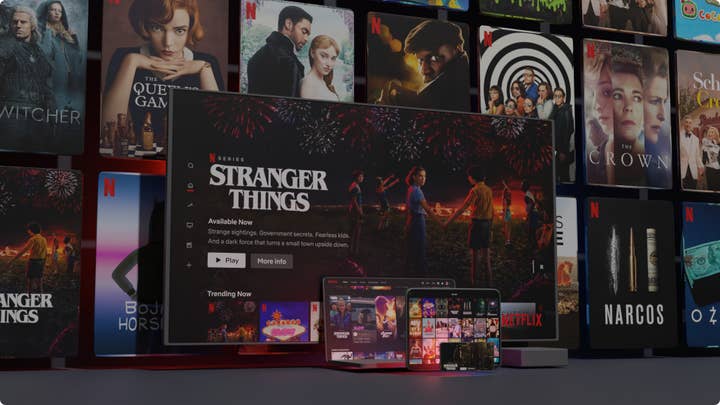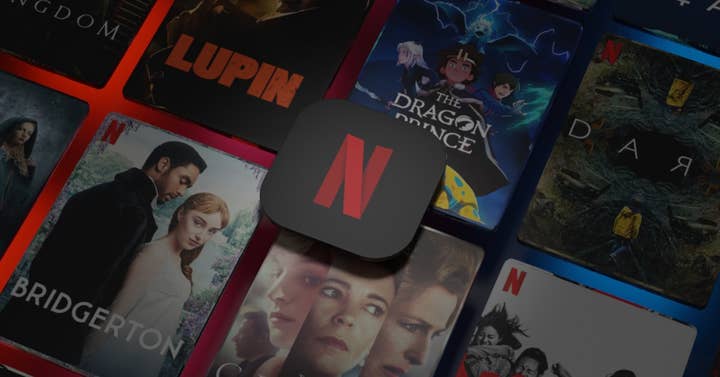Netflix's games won't be the Netflix of Games | Opinion
Those expecting the streaming giant to take a Stadia-like approach to games will be disappointed - but what Netflix is doing instead could be more creative and interesting.
The games industry loves little more than a good dose of rumours and speculation about giants from other fields of industry eyeing up an entry into this market.
Sometimes, those rumours pan out -- the long-speculated entries of Sony and then Microsoft into the console business being, in many ways, the granddaddies of this kind of rumour -- and other times they don't, either because it turns out that a supposedly interested party isn't all that interested after all (as has been the case with decades of rumours of Disney's intention to buy its way into a major position in the industry) or simply because it turns out that they're interested but haven't really got a clue what they're doing (alas, poor Nokia).
In recent years, all the hottest speculation about who's got their eyes on stealing a slice of the games industry's revenues has focused around cloud services and video streaming companies, in line with the conventional wisdom that the industry's technological future lies in that direction. It helps that there's been at least some fire in amongst the smoke, even if the actual fruits of engagement from those companies thus far -- such as Google's Stadia service or Amazon's Crucible online shooter -- are more likely to join Nokia's sidetalkin' endeavours in the bonus round of an industry pub trivia quiz in a few years than to seriously challenge any of the existing dominant players.
We've become so accustomed to describing that holy grail of streaming services as a "Netflix for Games" that some assume that's what Netflix would want to do
Until this month, however, the major company with the highest ratio of smoke to fire was Netflix. The streaming giant's ambitions in the games space were hotly rumoured -- bolstered by the company's experiments with game-like interactive narratives, including the much-discussed Black Mirror: Bandersnatch along with a variety of kids shows.
Details of what the company was up to, however, were scant to the point of being completely absent, a void which was cheerfully filled with all manner of speculation about the firm's intentions. Some of the more outlandish claims -- which posited that Netflix was setting itself up to be the go-to game streaming service that would succeed where Stadia had failed -- seemed to be based on little more than a linguistic accident; we've become so accustomed to describing that holy grail of streaming services as a "Netflix for Games" that some people found it easy to assume that that's what Netflix itself would want to do in video games.
We still don't know much about Netflix' ambitions, but we know a damned sight more than we did a few weeks ago. We know that the ambitions are real, for one thing; the hiring of former Facebook Reality Labs and EA executive Mike Verdu as VP of game development confirmed that Netflix plans to do enough game development to warrant having a VP for it, after all. That the company intends to expand into gaming was further confirmed by a brief mention in its quarterly earnings, and we got a few more details on that in the investor call following the earnings.
What details we've seen have confirmed the second most important thing about Netflix' gaming ambitions, beyond their mere existence: nominative determinism be damned, Netflix doesn't intend to be the "Netflix for Games" (gods, this is going to get confusing to write). It's starting relatively small, focusing initially on mobile titles that tie-in with its movie and series IPs in creative ways -- viewing games as a way to boost the value of those IPs and fans' engagement with them, while also building some extra value into people's existing Netflix subscriptions.
This is probably going to be viewed as a major disappointment for those who had hyped themselves up for Netflix picking up Google's dropped ball and carrying it over the line -- but looking at the situation rationally, it makes perfect sense for Netflix to approach games more cautiously and in a way that builds organically on its existing service and plays to its strengths. Trying to launch a AAA-focused game streaming service would be a much more drastic departure for Netflix than many people seem to assume, to the point of essentially involving retooling everything the company does; despite the comparisons that are often drawn between them, there's actually not that much direct synergy between running a service like Netflix and running a game streaming service.

Only a minority of the technical challenges are shared between these two businesses, and the model for how players engage with games (in terms of time spent, regularity of interaction and so on) is very different from TV. Moreover, the expertise Netflix has built up as a content creator in many different regions around the world (which is often overlooked but is arguably its most valuable advantage as a company) mostly won't translate to games -- it may even detract from efforts on that front by creating a host of things the company would need to unlearn in order to become an effective game creator, as many developers who bear the scars of trying to work with movie and TV studios can tell you. The list of reasons why Netflix trying to become the "Netflix for Games" doesn't actually make a whole lot of sense is long.
Crucially, those reasons mostly also apply to the other big video streaming giants out there. Amazon's cloud services division makes it a little more sensible for them to go down that road, perhaps, but it would be an enormous departure and likely disastrous undertaking for the likes of Disney+, HBO Max or Paramount Plus. Each of those media and streaming giants holds major libraries of IP which, on paper, make the idea of making a pitch to be a major player in video games appealing -- Marvel, Star Wars, DC Comics, Star Trek and so on.
Trying to launch a AAA-focused game streaming service would be a much more drastic departure for Netflix than many people seem to assume
But in practice, the degree of effort and investment required to make "Games" into a meaningful tab on that Disney+ home screen would be eye-watering and the eventual value of such a proposition, compared to simply investing more heavily in video content, is far from certain. (From the perspective of the broader industry and its consumers, of course, the good news here is that it's unlikely that those IPs will end up being balkanised across various competing streaming services and will remain available on other platforms and services for the foreseeable future.)
Instead of a quixotic effort to transform itself into a dominant player in video games overnight, what Netflix seems to be proposing sounds like an exploration on two fronts. It's interested in developing mobile games to expand and promote its movies and series -- hardly a new idea, but certainly an area in which there's a lot of interesting creative work that could be done if the company is willing to really get behind the concept.
This approach also allows it to affirm from the outset that it won't be doing any kind of microtransactions in its games, which is interesting in part because it clarifies that Netflix doesn't view games as an additive revenue stream, but also because it feels like another data point related to a growing public pushback against IAP and other such systems from companies who prefer a flat subscription business model.
The other front Netflix seems interested in (which overlaps with that primary front, at least to some extent) is continuing to develop branching narrative titles, both on its own streaming platform and through mobile devices. Black Mirror: Bandersnatch is often mentioned as the progenitor of this field for Netflix -- although kids-focused titles, including an adaptation of Telltale's Minecraft: Story Mode, were earlier pioneers for this kind of interactive experience on the platform.
The whole notion of the branching narrative game -- or "choose your own adventure", depending how much you want to get sued -- is one that's had a renaissance in the past few years. Drawing inspiration from sources like Japanese visual novel titles as well as from creators' childhood memories of rolling dice to see what page they should turn to next, the kinds of games being created and refined by studios like Telltale and Dontnod have turned out to be enormously successful, allowing creative experimentation with narrative and character, and appealing to a wide and diverse demographic audience.
As yet, the technology to deliver a full experience on a par with something like Life is Strange via the Netflix platform isn't quite there -- but the proof of concept has been done, and with Netflix' new interest in mobile development, the potential for cross-media games that tie the different platforms together and open up a whole new audience and business model for branching narrative games seems enormous.
The disappointment that some people will no doubt feel that Netflix' ambitions in games don't skew more strongly towards AAA streaming should be tempered by the fact that what the company is actually pursuing is much more realistic and plays more effectively to its true strengths. More than just another wealthy corporation entering the market with the intention of outspending rivals for dominance of an existing market sector, it's far more exciting to see a company enter games with the intention of bringing its significant resources to bear on trying something new -- and potentially creating a whole new area of the market in the process.



.jpg?width=291&height=164&fit=crop&quality=80&format=jpg&auto=webp)





